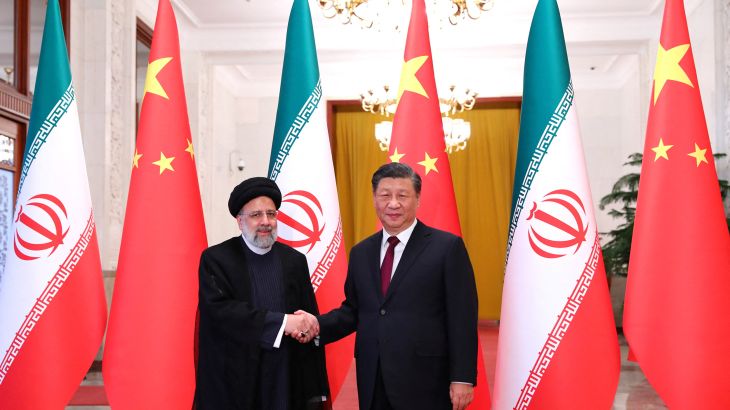China’s Xi conveys support for Iran during Raisi’s visit
Xi said China will continue to ‘participate constructively’ in talks to resume negotiations on Iran nuclear agreement.

Chinese leader Xi Jinping expressed support for Iran during a visit to China by President Ebrahim Raisi as Tehran tries to expand relations with Beijing and Moscow to offset Western sanctions over its nuclear development.
“China supports Iran in safeguarding national sovereignty” and “resisting unilateralism and bullying,” Xi said in a statement carried by Chinese state TV on its website on Tuesday.
Keep reading
list of 4 itemsWhat’s behind Iran and Russia’s efforts to link banking systems?
Iranian-French academic Fariba Adelkhah released from Iran prison
Iran’s Raisi takes aim at ‘enemies’ on revolution anniversary
His comments came as China hosted Raisi on his first state visit to the Asian economic giant and the first by an Iranian president in 20 years.
Xi called for a proper resolution to the Iran nuclear issue as he expressed Beijing’s “solidarity” with Iran amid global uncertainty.
China will continue to “participate constructively” in talks to resume negotiations on implementing the Iran nuclear agreement, Xi told Raisi in talks in Beijing.
A 2015 nuclear agreement limited Iran’s uranium enrichment programme to make it harder for Tehran to develop nuclear arms in return for lifting international sanctions. Iran says it was further developing nuclear energy for peaceful reasons.
But in 2018, then-United States President Donald Trump unilaterally abandoned the deal, saying it had not done enough to curb Tehran’s nuclear activities, and reimposed sanctions.
China has criticised Washington for withdrawing from the deal and insists the US should make the first move in reviving the pact.
In September, the US imposed new sanctions on companies involved in Iran’s oil exports, including five based in China. Washington said it would continue enforcing sanctions on Iran’s oil and petrochemical sales so long as Tehran continues to accelerate its nuclear programme.
Raisi was accompanied by a large Iranian trade and finance delegation in Beijing and was earlier greeted by Xi on a red carpet.
“In the face of the current complex changes in the world, times, and history, China and Iran have supported each other [and] worked together in solidarity and cooperation,” Xi said, according to state broadcaster CCTV.
Pressure over Ukraine
Both countries face pressure from Western nations over their positions on Russia’s invasion of Ukraine, while Iran is already under strict US sanctions due to its nuclear programme.
“China is Iran’s biggest trading partner and the only customer of its heavily-sanctioned oil exports,” said Al Jazeera’s Katrina Yu. “US-led sanctions have left Iran in its toughest economic situation in more than 40 years.”
Iran has emerged as one of Russia’s few remaining allies as Moscow has been pushed deeper into international isolation over the invasion.
Western countries have accused Tehran of supplying armed drones to Russia for use in its war in Ukraine, a charge Iran denies.
In December, Washington outlined what it said was an extensive relationship between Iran and Russia involving equipment such as helicopters, fighter jets and drones.
Moscow’s offensive in Ukraine is a sensitive issue for Beijing, which has sought to position itself as neutral while offering diplomatic backing to its strategic ally Russia.
“Xi Jinping says China will continue to take part in negotiations to get the agreement reinstated,” Yu said. “Ebrahim Raisi’s visit comes as both China and Iran strengthen their relationships with Russia. Both sides say they’re opposed to a world order led by the United States and its allies.”
According to CCTV, the two sides signed a number of bilateral cooperation documents in the fields of agriculture, trade, tourism, environmental protection, health, disaster relief, culture and sport.
Raisi and Xi had first met as presidents on the sidelines of the Shanghai Cooperation Organisation summit in Uzbekistan in September. China had supported Iran’s now-successful bid to become a full member of the organisation.
Last year, Iran and China also began the implementation phase of a 25-year cooperation accord under which China is to invest billions of dollars in Iran’s petroleum sector in exchange for the supply of oil and petrochemical products. China is already Iran’s biggest trading partner.
The pact was originally proposed by Xi on his visit to Iran in 2016.